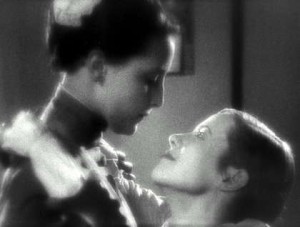This is a page on which we gather questions we’d like to discuss with Cherríe Moraga on Wednesday. Please add more!
Also, please check out Cherríe Moraga’s website to get an idea of the depth and breadth of her work in academia, theater, and as an activist. Here is her biography and some theater production photos. And here is an interesting interview with her (from 2000). In it, she says, “Both my essays and plays attempt to explore a political question or contradiction through the mind or the heart. By that I mean, both genres require analysis and a heart-felt honesty. But the essay is fundamentally one-voiced perspective, my own. Theater allows for contradiction to reside among the characters. They show themselves and in the showing the political issues regarding the oppressive aspects of the dominant culture or of our culture are exposed through the “living bodies” of the actors. The audience receives many perspectives through divergent characters. And although the playwright may try to direct the audience to her own perspective, she cannot thoroughly enforce their perception of it. Also, as August Wilson has said, plays are fundamentally generated by metaphor and story. My plays always start with an image that reflects the heart of the story to be told.”
- What can you tell us about the style of “A XicanaDyke Codex of Changing Consciousness”—why did you write the essay in this way, and what are your influences (if any)? Does the style help you get the “changing consciousness” message across in some way?
- Related to this question, can you explain your use of colloquialisms such as ‘cuz’ in your writing? What do you gain and what do you think is lost (if anything) in the use of these?
- Is there any recent work by queer studies academics, writers, or/and activists now that you feel particularly connected to?
- In “A XicanaDyke Codex of Changing Consciousness,” you profess a certain estrangement from the LGBTQ movement. Since the essay was written, have things changed for you in this regard? Why or why not?
- This quarter, we talked a lot about the idea of a queer family—what constitutes it, what makes it queer, what it shares and doesn’t share with heteropatriarchal ideas about family in Western culture. What role does “family” play for you, in the larger social (but maybe also personal) sense? What about “home”?
- There are certain recurring images and metaphors in your writing (in Giving up the Ghost, the river and the dream, for example). Can you tell us about some of your favorite ones?
- Who is your ideal envisioned audience or audiences (for the different kinds of writing, speaking, and performing you do)?
- We are only reading your play “Giving up the Ghost,” unfortunately, and not seeing it live. So what are we missing about the play that a stage performance can bring out?
- You’re an eloquent proponent of the uses of fiction and the emotional truth it captures. When do you feel committed to facts, if ever, and what role do you see recourse to objectivty (“objectivity”) playing politically?
- What kind of revolution can you imagine succeeding today? Do you think “feminism” is the banner under which revolution should fly? Is there some other “ism” you see ascending to a position of prominence?
- I’m a white girl from New Mexico, so your fear of the loss of Nuevo Mexico to New York artists caught my eye. What role do you feel separatism plays in your politics?
- On another personal note: my dad (who grew up very poor, and who still is) loved singing “The Prisoner’s Song,” which serves as your epigraph. It’s a bluegrass song, which calls to mind issues surrounding white classism and the misogyny it breeds. (How many bluegrass songs use women as narrative props? How many fetishize domestic violence? The speaker is almost always male.) Do you think much about white-on-white oppression and how its lessons might be useful in combating racism, sexism, etc?
- Can you tell us how you got the idea for Giving Up the Ghost and what the heart of your idea was, for you?
- There s a heartbreaking rape scene memory. Why? What does it signify, how does it connect to the larger issues in the play, for you?
- Do you have a favorite passage or moment in the play, one that embodies or expresses something very important?
- This quarter we’ve discussed the idea of ‘queer time’. How have you been able to reconcile the very queer structure of something like Giving up the Ghost with the very generational and ancestral Xicana politics in some of your other works?







